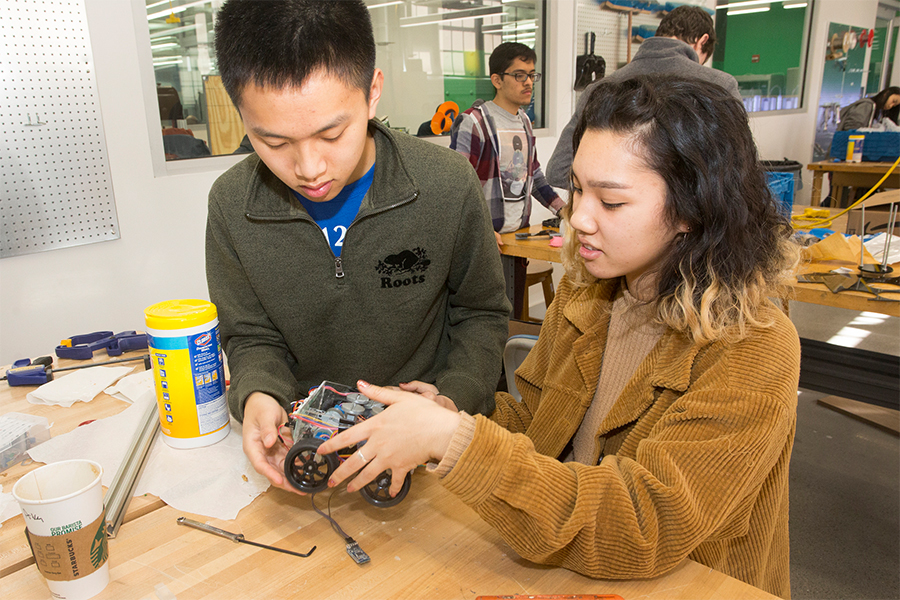
CMU Students Develop Innovative Energy Solutions at Build18
By Emily Giedzinski
Media InquiriesThe Electrical and Computer Engineering (ECE) Department at Carnegie Mellon University hosted its annual Build18 festival Jan. 15-19. More than 300 students from different disciplines came together to create projects that develop their technical and creative skills. The final result was a real product they demoed on the last day. Some of these students created work that relates to energy and sustainability. Learn about some of the energy-related projects featured at Build18:
Automated Garden
The Arduino-based (open-source electronic platform utilizing hardware and software) smart garden, powered by solar energy, has a sprinkler that moves in 2-D space. It automatically waters plants and has the ability to collect plant data.
Autonomous RC Car
One team paired up to develop an autonomous RC Car that could be used for future explorations not limited to autonomous driving. Using a raspberry pi, a small single board computer, the group partnered to develop an autonomous RC car that abides by traffic rules and can respond to unexpected obstacles.
Electricity Generating Footwear
This team designed footwear that will generate electricity as one walks. They used hydropower to generate the electricity. The students then transformed that energy for use by devices like an iPhone.
“For a long period of time, people kept reaching out to nature for a new source of power due to the energy shortage. They haven’t realized that they, themselves can create a large amount of energy,” said ECE student Rouhai Ge who is part of the Electricity Generating Footwear team. “For so long, this energy has been wasted while we move. But if this energy can be collected and transformed into electric power, not only are fuels saved, but also nature is protected.”
Electric Longboard
Students designed an electric longboard that can be decoupled into five subsystems. It’s equipped with lithium-ion polymer batteries, and an electronic stability control, which controls the Brushless DC Motor. The longboard includes a controller to adjust the speed, a motor to turn electrical energy into mechanical energy and a powertrain to deliver that mechanical energy to the ground.
EV Charger Adaptor
A group of students came together to design an Electric Vehicle (EV) charger adaptor for the Carnegie Mellon Racing team that allows the team to charge their race car more easily.
Flywheel Energy Storage Prototype
This group created a prototype of a flywheel energy storage system. Instead of using conventional batteries that store electricity chemically, the prototype will store energy mechanically by using spinning rotors that reach high speeds. The students tested the efficiency of the system, and explored different aspects of energy storage.
Sun Tracking Solar Panel
A team designed a solar panel that orients itself towards the sun. They utilized linear actuators and an Arduino-controlled photosensor to create a system that will calculate and rotate to the angle of maximum irradiation.
Build18 is a natural extension of the activities ECE and other department’s students pursue during the academic year, but that doesn’t mean a lot of additional effort isn’t required to pull it off.
The team that designed the Sun Tracking Solar Panel said their project focuses on technology that emphasizes renewable energy. Group member Tanvi Shah says the project was “a collaborative effort.”
“All of our backgrounds were necessary,” said Shah of the mixed Mechanical Engineering and ECE student team. “Me, Nina and Cami were working on software, while Frank and Cesar worked on the hardware. But what jobs we did intermingled quite a bit."
Build18 not only gives students the opportunity to branch out and create new and different technologies, it can also lead to a job offer. Intel, a Build18 sponsor, said the company is looking for students from a broad range of majors to fill spots on its team.
“We look for computer engineers, computer science majors, physics majors, chemical engineers and mechanical engineers,” said Melinda Murdoch, campus relations manager for Intel. “We will definitely be coming back. The projects are just so innovative and creative.”